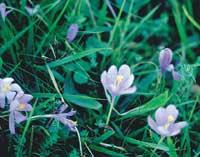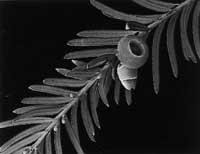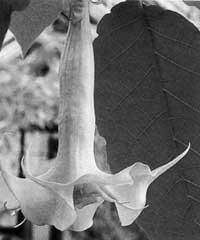Tisanes: auxiliary medicinal plants
2000/10/01 Lorenzo, Arantza | Uranga, Ane Miren Iturria: Elhuyar aldizkaria
The benefits of these plants are usually included as a tisan. Three types of tisanes are known:
1. Infusions: it is the softest and most common type. When the water begins to boil the plant is thrown, it is immediately removed from the fire, the container is covered and ten minutes are expected for the plant to release its contents.
2. Cooking: The tea is more concentrated. It is used when it is more difficult to extract the active ingredients of the plant, as in the case of the root or skin. To prepare it the part of the corresponding plant is inserted in cold water and heated. When it begins to boil, the fire is lowered and simmered for 10 to 20 minutes.
3. Maceration: is considered the most appropriate and natural way to extract to the plant all its healing capacity. In a liter of warm cold water 20 g of plants are macerated. The time can vary between 10 and 12 hours for flowers and leaves and up to 24 hours for trunks, roots and barks.
To prepare any type of tisan it will be very important to respect the recommended doses. And if the doses are smaller, they may not be effective for what we want, and on the other hand, excessive doses can cause an opposite effect, that sedative tissue becomes a stimulant (as happens with chamomile). So be careful of the doses and always respect them.
Herbal mixtures are sold in medicines and herbalists to prepare tisanes for each disease. The properties of the most known and accessible plants are described below:
- Chamomile: three flowers are enough to prepare a tisana. In this way, it is suitable to facilitate digestion. In case of using excessive doses produces the puff, so as indicated, be careful with the doses. In the case of nerves it is also antispasmodic.
- Mint: just use 10 g of mint per liter of water. It can be taken calmly after any meal. Promotes digestion and relaxation of the nerves of the stomach.
- Anise: to prepare a cup you must use 2 g of anise seeds. It is aromatic and useful in dyspepsis, colic and indigestion. In the case of the middle mother, it also helps to produce more milk.
- Eucalyptus: a tisana prepared with 10 g of eucalyptus leaves per liter of water calms the cough and improves bronchitis, asthma and lung colds.
- Sunflower: in a liter of water 5 g of flowers or tender stems boil for 10 minutes and the tan is beneficial for respiratory diseases.
- Laurel: prepare infusion with 15 g of bay leaves and 1 liter of water. Helps in rheumatism and difficult digestion.

Gai honi buruzko eduki gehiago
Elhuyarrek garatutako teknologia






